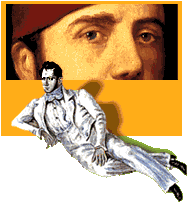 |
Eugène FROMENTIN, Diary of a voyage in Egypt, 1869.
Oriental painter and writer, Eugène Fromentin (1820-1876) was invited by the Khedive of Egypt, as were 60 other privileged French people, to take part in the Suez canal inauguration festivities in 1869. He went on a voyage of Upper Egypt before going to Ismailia for the ceremonies.
"Wednesday 17 [November].
Ismailia. The European town. The Arab encampments, the guests’
encampments: an immense town of tents. Very strange.
The Port Saïd party was held yesterday. We would have missed it
anyway. This evening, the squadrons are arriving. There is nothing
yet in the large basin of Lake Timsah except a couple of Egyptian
boats. There is some nasty gossip going round. The Latif, an Egyptian
boat, has run aground and is blocking the canal; last night, enormous
efforts were made to move it to one side. Three hundred men worked
on this crucial job. The Viceroy, Nubar-Pasha and M. de Lesseps
spent the night at the scene. They say that the Viceroy threatened
to impale a few officers. The accident came about as a result
of the British captain being distracted and making a false manoeuvre.
Will the Aigle get past?
If she does, the canal is open, if not, it is a disaster of easy-to-imagine
proportions, even if you are not involved in the politics or finances
of this enormous enterprise.
A visit to various tents. Music everywhere, a lot of preparation
for lighting and illuminations for this evening, whether public
or private, official or voluntary. Flags, banners, streamers,
the French colours everywhere.
[...] It is 4a.m. Three large steamers, all decorated, sailed
out of the Suez canal and came to anchor in the basin. Hurrah!
the southern passage is clear. At 5.30a.m., a little smoke and
the tip of a high mast appeared above the high sandy banks of
the northern part of the canal. The great mast of the ship which
still could not be seen, bore the imperial flag of France: it
was the Aigle.
It slowly passed us, its paddle-wheels only just turning, and with great
care a precaution which added to the solemnity of the moment.
She finally came out into the basin. Rounds of artillery: all
the batteries greeted her and the huge crowd clapped. It was really
amazing. The Empress waved her handkerchief from her high poop.
Next to her was M. de Lesseps whose hand she forgot to shake in
front of this public, which had come from every corner of Europe and which was
extremely emotional.
The Aigle continues along its way across the lake at the same slow pace.
The problem has been resolved. The enterprise is saved. The vessels
from Suez and the Aigle from France will anchor side by side at the point where the seas
of India meet the waters of Europe.
[...] In the evening, illuminations everywhere. Fireworks are
let off in front of the Viceroy’s palace. It is open-house everywhere.
There is a big tent with 500 settings and another of 200 or 300.
The table at the governor’s palace is the most original and best
of all. Extravagant dinners, great wines, exquisite fish, young
partridges and wild duck. Seven to eight thousand people to feed
in the middle of the desert. How the service and everything required
was provided is a mystery. We are in the middle of an Arabian
Nights story. Incredible luxury. All that in the middle of the
sand. Ismailia itself sits on a dune, I do not think you could
find a single pebble. You sleep in the sand, on mats on the sand
with sand in your bed.
A fantastic array of the most extraordinary, superfluous and sumptuous
things mixed in with the most unbelievable destitution.
[...]Thursday 18.
Many of our companions have appeared, some after various disasters.
Some whose ships have been bobbing up and down for three days
so they have seen nothing of Port Saïd or Ismailia. Some people
were left on beaches and forced to sleep in the sand; others have
arrived by flat-bottomed boat or by the postal launch, leaving
luggage and all else behind. They lacked food and have not slept.
Some are ill, some discouraged, others exasperated. They decide
on extreme courses of action, they complain and protest and get
ready to go straight back to France. That is all very well, but
how? It is hardly possible by canal and it is extremely hazardous
by rail.
There is nothing more amusing than the future boulevard planted
with trees, bearing the name, ‘Mohammed-Ali Street’ which looks
out onto the lake.
There you can find people you have not seen for 20 years; at each
step, you see a Parisian face. In vain you search for your travelling
companions. They have disappeared somewhere, lost, never to be
found. The coming and going is indescribable: dromedaries, donkeys,
English carriages, Arab horses, English horses, horsewomen, cavaliers
and troops filing up and down. Women from Paris, Vienna, London,
Milan and Madrid. And even stranger food.
The more you experience this Eastern hospitality and the extent of, and overindulgence in, it,
unequalled in modern times and unparalleled in Europe, the more it begins to take on the aspect of something miraculous. Nor is it the
dullest memory of this fantastic voyage. Nowhere will the two
elements which go to make up Egyptian splendour, the useless and the grandiose,
the excess and the destitution, ever be seen in more extraordinary
proportions. Never could chance have brought us the most incredible surprises which the magic of this place has given us over the last forty days.
This is the real point to make about this fantastical voyage, which was the closest thing to a dream that I have ever seen when I was awake.”
 |